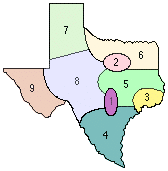UIL Speech Judges
If you have corrections, questions or comments regarding this information, please notify The UIL Speech and Debate department at speech@uiltexas.org or 512-471-5883.
Neri Sandoval
Current high school:
None
Currently coaching?: No
Conference: 13-4A
Number of years coached: 4
Number of tournaments judged: 0
High school attended:
Moises E. Molina
Graduated high school: 2007
Participated in high school: No
Participated in college: No
Judging qualifications:
I plan on judging at DUDA HS tournaments in policy and world schools debate. I also plan to judge at UIL LD and congress meets as well. This year is just starting and I'm filling this out Wed. Sept. 6th, 2023, prior to any official tournaments taking place.
Judging Philosophy
CX
Judging approach: Other (please explain below)
Policy priority: Resolution of substantive issues is more important than communication skills
Evidence philosophy: Quantity of evidence and quality of evidence are of equal importance
Paradigm: I've been judging policy debate since the Fall of 2020 to the present academic year(Spring of 2024). Previously to being a High School AP World History teacher at the school of the talented and gifted at Townview in Dallas, I served as an instructor at the English and Latin American Latino Studies Departments at the University of Illinois at Chicago, where I incorporated debate into my courses. As such, my approach to judging could be described as a synthesis between a policy making judge and a tabula rasa judge. When deciding a round I try to put myself into the shoes of a national legislator who must vote for the best policy offered in the debate, focusing on the AFFs plan and the NEGs ability to clash on the feasibility implementing the AFF. And I like to adopt the posture of a tabula rasa judge because it is unfair for judge's to vote based on their own knowledge of the issues and/or their own politics. I leave it to the debaters to demonstrate gaps in the opponent's plans, contradictions of values, or to extend each others timelines, minimize each others magnitudes, break link chains, etc. Your rebuttals are key for giving me a path to voting for your plan, so be sure to flow the debate, and give your most strategic clashes. And whatever you say under your timed speech always already enters the record as grounds for the debate, I do not strike out previously made claims if you happen to lose on those grounds later on in the match. Also, I really appreciate it when students argue in good faith about the resolution as opposed to when students choose to argue about the rules of policy debate instead. I mean, it makes sense. Students should not introduce new evidence in rebuttals and if something like that occurs, then I am flexible to hearing your claims. But if the entire argument is about the technicalities of CX policy debate then I feel like we are wasting our time / avoiding the actual topic. Final note: debaters must use evidence ethically, quoting with integrity to the source. If your evidence gets called into question and it is clear that the evidence says the opposite of what you claim, or does not exist, then this may impact the way that particular argument is evaluated.
LD
Approach: Communication skills and resolution of substantive issues are of equal importance
Philosophy:
I've been judging policy debate since the Fall of 2020 to the present academic year(Spring of 2024). Previously to being a High School AP World History teacher at the school of the talented and gifted at Townview in Dallas, I served as an instructor at the English and Latin American Latino Studies Departments at the University of Illinois at Chicago, where I incorporated debate into my courses. As such, my approach to judging could be described as a synthesis between a policy making judge and a tabula rasa judge. When deciding a round I try to put myself into the shoes of a national legislator who must vote for the best policy offered in the debate, focusing on the AFFs plan and the NEGs ability to clash on the feasibility implementing the AFF. And I like to adopt the posture of a tabula rasa judge because it is unfair for judge's to vote based on their own knowledge of the issues and/or their own politics. I leave it to the debaters to demonstrate gaps in the opponent's plans, contradictions of values, or to extend each others timelines, minimize each others magnitudes, break link chains, etc. Your rebuttals are key for giving me a path to voting for your plan, so be sure to flow the debate, and give your most strategic clashes. And whatever you say under your timed speech always already enters the record as grounds for the debate, I do not strike out previously made claims if you happen to lose on those grounds later on in the match. Also, I really appreciate it when students argue in good faith about the resolution as opposed to when students choose to argue about the rules of policy debate instead. I mean, it makes sense. Students should not introduce new evidence in rebuttals and if something like that occurs, then I am flexible to hearing your claims. But if the entire argument is about the technicalities of CX policy or lD debate then I feel like we are wasting our time / avoiding the actual topic. Final note: debaters must use evidence ethically, quoting with integrity to the source. If your evidence gets called into question and it is clear that the evidence says the opposite of what you claim, or does not exist, then this may impact the way that particular argument is evaluated.
Contact Information
email: nesandoval@tagmagnet.org
cell: 312 8460859
office:
Availability Information
Meet types:
District
CX State
State Meet
Congress Region
Qualified for:
CX
LD
Congress
Travel
Region of residence:
2
I will travel to: 1 2







